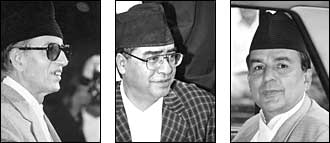 By most accounts, Nepal's democracy is facing its gravest threat since we had those two drafts of the post-Panchayat constitution competing for our attention in 1990. In the intervening years, shadowy forces of subversion have been closing in on the mainstream from the right and left. The people have sprained their necks looking over their shoulders but are no closer to pinpointing the plotters. Politicians who say they recognise some of the faces don't want to name names. The country is left correlating cryptic circumstances to sniff the modus operandi of the purported agents of regression.
By most accounts, Nepal's democracy is facing its gravest threat since we had those two drafts of the post-Panchayat constitution competing for our attention in 1990. In the intervening years, shadowy forces of subversion have been closing in on the mainstream from the right and left. The people have sprained their necks looking over their shoulders but are no closer to pinpointing the plotters. Politicians who say they recognise some of the faces don't want to name names. The country is left correlating cryptic circumstances to sniff the modus operandi of the purported agents of regression. Prime Minister Sher Bahadur Deuba and his band of Young Turks insist they were compelled to dissolve the House of Representatives in order to defend the spirit of parliamentary democracy. That kind of talk is Greek to Nepali Congress president Girija Prasad Koirala and his hardy loyalists in the ruling party. They want the Supreme Court to resurrect the house, and are pleading their case in the people's name. It would have been nice to describe this glorification of the people from all sides as the saving grace of the squabble. But Nepalis have been the object of official exaltation ever since our modern state enshrined the plumpness of the people as the emblem of the palace's power. Demonise the Ranas all you want for usurping power and undermining the nation's faith in itself. But they did put a great premium on popular perceptions of their rule. Under their version of the fairness doctrine, swift and ruthless justice was the cardinal tenet of statecraft. If it also became a fool-proof way of extracting complete obedience from the commonality, part of the reason was Nepalis' profound sense of fealty. True, Panchayat ideologues went against basic human psychology in outlawing organised political behaviour. But political ideology was the only restriction. You could still organise into clusters of women, youth, elderly, workers, farmers and ex-servicemen and howl against everyone who you thought came under the convenient rubric of anti-national elements.
A lot of people are put off by Kangresis' insistence that they're the only democrats alive in the country. Let the record speak for itself. The left officially extols the dictatorship of the proletariat. The Rastriya Prajatantra Party will probably have to wait another generation before it can biologically cast off all of its partyless baggage. The Nepal Sadbhavana Party exudes exclusivity in almost every shape and form, except name. As for the parties outside parliament, well, let's let the people send them inside the chamber before passing judgement. The point is, whether we like it or not, Kangresis have an exclusive grip on the mantle of Nepali democracy, at least, on the version the world venerates today. The sad part is that this complacency has fuelled much of the party's internal conflicts.
For the first week after the party-government collision, it looked like the rival Kangresi camps hated each other so much that they could no longer consider peaceful coexistence. But, then, middle-of-the-roaders gained ground. For long, Ram Chandra Poudel sounded like a voice in the wilderness. Today he seems to have enough followers in the party that both camps feel comfortable in projecting him as their future leader. (The descent from speaker to deputy prime minister must have been difficult for our thinker from Tanahun. But it looks like that was as bad as it could get for him.)
There is a clear danger sign, though. The moderates' unity endeavour revolves around ownership of the four-star flag and the tree. That focus contains the seeds of future conflicts. The best course might be for Kangresis to amicably dissolve the party. The organisation has installed democracy in the country twice and a lot of people are grateful for that. But it's time to look ahead. The dissolution accord should specifically bar the signatories from using the name, flag or election symbol of the defunct body in any way. Members of successor parties would be free to argue over who has the right mixture of democracy and socialism to cure Nepal's ills. But no one gets to make use of the Koirala lineage or legacy. Instead of looking for that fistful of soil to recall our duty to the nation, we can reach out for a future where family ties are just one of several tools of political mobility. It might be difficult for some to contemplate a career in public service with the Nepali Congress safely consigned to the history books. But the country can expect to turn a new page. In the midst of more than one certifiably democratic party, our freedoms might become a little more secure.


